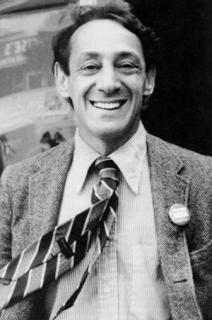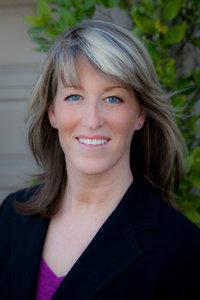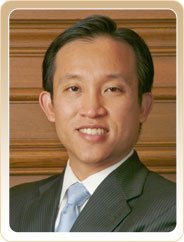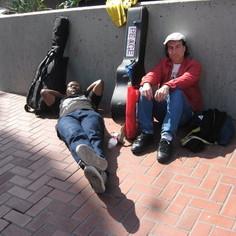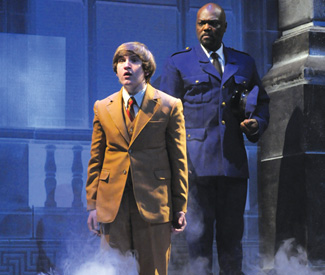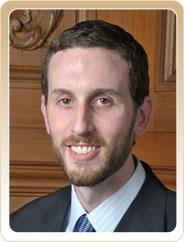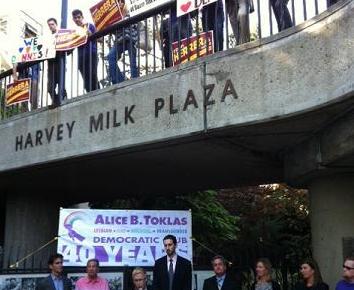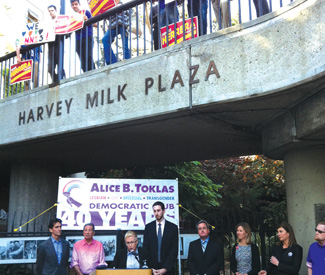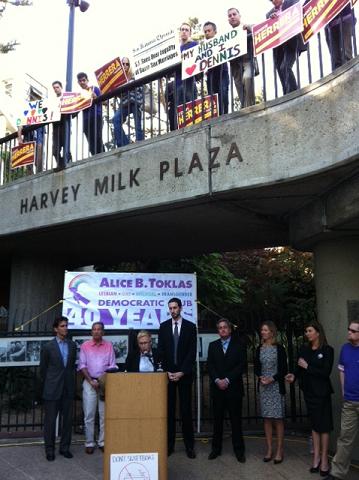Through May 20
San Francisco International Arts Festival Various venues. (415) 399-9554,www.sfiaf.org. Check website for prices and times. Celebrate the arts, both local and international, at this multimedia extravaganza.
May 19
Asian Heritage Street Celebration Larkin and McAllister, SF. www.asianfairsf.com. 11am-6pm, free. Featuring a Muay Thai kickboxing ring, DJs, and the latest in Asian pop culture, as well as great festival food.
Uncorked! San Francisco Wine Festival Ghirardelli Square, 900 North Point, SF. (415) 775-5500,www.ghirardellisq.com. 1-6pm, $50 for tastings; proceeds benefit Save the Bay. A bit of Napa in the city, with tastings, cooking demonstrations, and a wine 101 class for the philistines among us.
May 19-20
Maker Faire San Mateo Event Center, San Mateo, www.makerfaire.com. $8–$40. Make Magazine’s annual showcase of all things DIY is a tribute to human craftiness. This is where the making minds meet.
Castroville Artichoke Festival Castroville. (831) 633-2465 www.artichoke-festival.com. 10am-5pm, $10. Pay homage to the only vegetable with a heart. This fest does just that, with music, parades, and camping.
May 20
Bay to Breakers Begins at the Embarcadero, ends at Ocean Beach, SF, www.zazzlebaytobreakers.com 7am-noon, free to watch, $57 to participate. This wacky San Francisco tradition is officially the largest footrace in the world, with a costume contest that awards $1,000 for first place. Just remember, Port-A-Potties are your friends.
May 21
Freestone Fermentation Festival Salmon Creek School, 1935 Bohemian Hwy, Sonoma. (707) 479-3557, www.freestonefermentationfestival.com. Noon-5pm, $12. Answer all the questions you were afraid to ask about kombucha, kefir, sauerkraut, yogurt, and beer. This funky fest is awash in hands-on demonstrations, tastings, and exhibits.
May 26-27
San Francisco Carnaval Harrison and 23rd St., SF. www.sfcarnaval.org. 10am-6pm, free. Parade on May 27, 9:30am, starting from 24th St. and Bryant. The theme of this year’s showcase of Latin and Caribbean culture is “Spanning Borders: Bridging Cultures.” Fans of sequins, rejoice.
June 2-3
Union Street Eco-Urban Festival Union Street between Gough and Steiner, SF. (800) 310-6563, www.unionstreetfestival.com. 10am-6pm, free. See arts and crafts created with recycled and sustainable materials and eco-friendly exhibits, along with two stages of live entertainment and bistro-style cafes.
June 9-17
San Mateo County Fair San Mateo County Fairgrounds, 2495 S. Delaware, San Mateo, www.sanmateocountyfair.com. 11am-10pm, $6–$30. Competitive exhibits from farmers, foodies, and even technological developers, deep-fried snacks, games — but most important, there will be pig races.
June 8-10
Queer Women of Color Film Festival Yerba Buena Center for the Arts, 701 Mission, SF. (415) 752-0868,www.qwocmap.org. Times vary, free. Three days of screenings from up-and-coming filmmakers with unique stories to tell.
June 10
Haight Ashbury Street Fair Haight between Stanyan and Ashbury, SF, www.haightashburystreetfair.org. 11am-5:30pm, free. Celebrating the cultural history and diversity of one of San Francisco’s most internationally celebrated neighborhoods, the annual street fair features arts and crafts, food booths, three musical stages, and a children’s zone.
June 10-12
Harmony Festival, Sonoma County Fairgrounds, 1350 Bennett Valley, Santa Rosa, www.harmonyfestival.com. One of the Bay Area’s best camping music festivals and a celebration of progressive lifestyle, with its usual strong and eclectic lineup of talent.
June 16-17
North Beach Festival, Washington Square Park, SF. (415) 989-2220, www.northbeachchamber.com. free. This year will feature more than 150 art, crafts, and gourmet food booths, three stages, Italian street painting, beverage gardens and the blessing of the animals.
Marin Art Festival, Marin Civic Center, 3501 Civic Center Drive, San Rafael. (415) 388-0151, www.marinartfestival.com. 10am-6pm, $10, kids under 14 free. Over 250 fine artists in the spectacular Marin Civic Center, designed by Frank Lloyd Wright. Enjoy the Great Marin Oyster Feast while you’re there.
June 22-24
Sierra Nevada World Music Festival, Mendocino County Fairgrounds Booneville. (916) 777-5550, www.snwmf.com. $160. A reggae music Mecca, with Jimmy Cliff, Luciano, and Israel Vibration (among others) spreading a message of peace, love, and understanding.
June 23-24
Gay Pride Weekend Civic Center Plaza, SF; Parade starts at Market and Beale. (415) 864-FREE, www.sfpride.org. Parade starts at 10:30am, free. Everyone in San Francisco waits all year for this fierce celebration of diversity, love, and being fabulous.
Summer SAILstice, Encinal Yacht Club, 1251 Pacific Marina, Alameda. 415-412-6961, www.summersailstice.com. 8am-8pm, free. A global holiday celebrating sailing on the weekend closest to the summer solstice, these are the longest sailing days of the year. Celebrate it in the Bay Area with boat building, sailboat rides, sailing seminars and music.
June 24-August 26
Stern Grove Festival, Stern Grove, 19th Ave. and Sloat, SF. (415) 252-6252,www.sterngrove.org, free. This will be the 75th season of this admission-free music, dance, and theater performance series.
July 4
4th of July on the Waterfront, Pier 39, Beach and Embarcadero, SF.www.pier39.com 12pm-9pm, free. Fireworks and festivities, live music — in other words fun for the whole, red-white-and-blue family.
July 5-8
High Sierra Music Festival, Plumas-Sierra Fairgrounds, Lee and Mill Creek, Quincy. www.highsierramusic.com. Gates open 8am on the 5th, $185 for a four-day pass. Set in the pristine mountain town of Quincy, this year’s fest features Ben Harper, Built To Spill, Papodosio, and more.
July 7
Oakland A’s Beer Festival and BBQ Championship, (510) 563-2336, oakland.athletics.mlb.com. 7pm, game tickets $12–$200. A baseball-themed celebration of all that makes a good tailgate party: grilled meat and fermented hops.
July 7-8
Fillmore Street Jazz Festival, Fillmore between Jackson and Eddy, SF. (800) 310-6563, www.fillmorejazzfestival.com.10am-6pm, free. The largest free jazz festival on the Left Coast, this celebration tends to draw enormous crowds to listen to innovative Latin and fusion performers on multiple stages.
July 19-29
Midsummer Mozart Festival, Herbst Theater, 401 Van Ness, SF (also other venues in the Bay Area). (415) 627-9141,www.midsummermozart.org. $50. A Bay Area institution since 1974, this remains the only music festival in North America dedicated exclusively to Mozart.
July 21-22
Renegade Craft Fair, Fort Mason Center, Buchanan and Marina, SF. (415) 561-4323, www.renegadecraft.com. Free. Twee handmade dandies of all kinds will be for sale at this DIY and indie-crafting hullabaloo. Like Etsy in the flesh!
July 21-22
Connoisseur’s Marketplace, Santa Cruz and El Camino Real, Menlo Park. Free. This huge outdoor event expects to see 65,000 people, who will come for the art, live food demos, an antique car show, and booths of every kind.
July 23-August 28
The San Francisco Shakespeare Festival, Various locations, SF. (415) 558-0888, www.sfshakes.org. Free. Shakespeare takes over San Francisco’s public parks in this annual highbrow event. Grab your gang and pack a picnic for fine, cultured fun.
July 27-29
Gilroy Garlic Festival, Christmas Hill Park, Miller and Uvas, Gilroy. (408) 842-1625,www.gilroygarlicfestival.com. $17 per day, children under six free. Known as the “Ultimate Summer Food Fair,” this tasty celebration of the potent bulb lasts all weekend.
July 28-29
27th Annual Berkeley Kite Festival & West Coast Kite Championship, Cesar E. Chavez Park at the Berkeley Marina, Berk. (510) 235-5483, www.highlinekites.com. 10am-5pm, free. Fancy, elaborate kite-flying for grown-ups takes center stage at this celebration of aerial grace. Free kite-making and a candy drop for the kiddies, too.
July 29
Up Your Alley Fair, Dore between Howard and Folsom, SF. (415) 777-3247,www.folsomstreetfair.org., 11am-6pm, free with suggested donation of $7. A leather and fetish fair with vendors, dancing, and thousands of people decked out in their kinkiest regalia, this is the local’s version of the fall’s Folsom Street Fair mega-event.
July 30-August 5
SF Chefs Food and Wine Festival, Union Square, SF. (415) 781-5348, www.sfchefsfoodwine.com. Various times and prices. Taste buds have ADD too. Let them spiral deliciously out of control during this culinary fair representing over 200 restaurants, bars, distilleries, and breweries.
August 4-5
Aloha Festival, San Mateo Event Center, 1346 Saratoga, San Mateo. (415) 281-0221, www.pica-org.org. 10am-5pm, free. You may not be going to Hawaii this summer, but this two-day festival of crafts, island cuisine, Polynesian dance workshops, and music performances might just do the trick.
Art and Soul Oakland, Frank Ogawa Plaza, 14th and Broadway, Oakl. www.artandsouloakland.com. $10 adv.; $15 at door. Sample delectable treats, joyfully scream through a carnival ride, get a purple unicorn painted on your forehead — all while rocking out to live jazz, R&B, acoustic, and gospel performances.
Nihonmachi Street Fair, Post between Laguna and Fillmore, SF. www.nihonmachistreetfair.org. 10am-6pm, free. Community outreach infuses every aspect of this Japantown tradition — meaning those perfect garlic fries, handmade earrings, and live performances you enjoy will also be benefitting a number of great nonprofit organizations.
August 5
Jerry Day 2012, Jerry Garcia Amphitheater, 40 John F. Shelley, SF. (415) 272-2012, www.jerryday.org. 11am, free; donate to reserve seats. Founded in 2002 when a dilapidated playground in the Excelsior was being transformed to what is now Jerry Garcia Amphitheater, Jerry Day continues as an art and music event brimming with local San Franciscan roots.
August 10-12
Outside Lands Music Festival Golden Gate Park, SF. www.sfoutsidelands.com. $225 regular 3-day ticket. Musical demi-gods like Stevie Wonder and Neil Young are headlining this year, and the rest of the jaw-dropping lineup makes us wish it were 2035 already so we can clone ourselves and be at opposite sides of the park at once.
August 11
Festa Coloniale Italiana, Stockton between Union and Filbert, SF. (415) 440-0800, www.sfiacfesta.com. 11am-6pm, free. When the moon hits your eye, like a big pizza pie, that’s amore. When you dance down North Beach, visiting every food truck you encounter, you’re in love.
August 18
Russian River Beer Revival and BBQ Cookoff, Stumptown Brewery, 15045 River, Guerneville. (707) 869-0705, www.stumptown.com. Noon-6pm, $55. You can’t really go wrong attending a festival with a name like this one. Entry fee includes live music, beer, cider, BBQ tastings, and your resurrection.
San Francisco Street Food Festival, Folsom from 20th to 26th St.; 25th St. from Treat to Shotwell, SF. (415) 824-2729, www.sfstreetfoodfest.com. 11am-7pm, free. You may think there is nothing quite as good your own mother’s cooking, but the vendors at La Cocina’s food fair are up for the challenge.
August 25
The Farm Series: Late Summer Harvest, Oak Hill Farm, 15101 California 12, Glen Ellen. (415) 568-2710, www.18reasons.org. 9am-5pm, $50. Head to Sonoma with Bi-Rite’s head farmer and produce buyer to check out Family Farm and Oak Hill Farm. Lunch is included in the ticket price and carpool drivers will be reimbursed for gas.
August 25-26
Bodega Seafood Art and Wine Festival, 16855 Bodega, Bodega. (707) 824-8717, www.winecountryfestivals.com. $12 advance, $15 at gate. The seaweed is usually greener on somebody else’s lake — but not this weekend. Have your crab cake and eat it too during this crustaceous celebration of food, wine, beer, and art.
September 8-9
Ghirardelli Chocolate Festival, Ghiradelli Square, 900 North Point, SF. (800) 877-9338, www.ghiradelli.com. Noon-5pm, $20. It’s finally time to put your at-home ice cream noshing skills to the test. For two-days only, chocolate lovers unite to celebrate all that is good in life — and by that we mean eating contests, chef demonstrations, and local dessert samplings.
September 9
EcoFair Marin 2012, Marin County Fairgrounds and Lagoon Park, Civic Center, San Rafael. (415) 499-6800, www.ecofairmarin.org. 10am-6pm, $5. This sustainability event brings together speaker presentations, exhibitions by energy reducing and conserving business leaders, and tasty raw and vegan food vendors, as a community effort to help bring about a healthier planet.
September 14-16
Ceramics Annual of America: Exhibition and Art Fair, Festival Hall, Fort Mason, Buchanan at Marina, SF. (877) 459-9222, www.ceramicsannual.org. $10. Contemporary ceramics from Korea, China, Mexico, Australia, and Italy, as well as top American artists’ works, will be showcased in this one-of-a-kind art show. Tours and discussions regarding the clay medium will be provided as a way to foster knowledge regarding the clay medium.
September 16
Comedy Day, Sharon Meadow, Golden Gate Park, SF. (415) 820-1570, www.comedyday.com. Noon-5pm, free. There are two secret cures for depression: sunlight and laughter. Comedy Day brings the two antidotes together for a cheery day of priceless (literally, it’s free) entertainment.
September 21-23
Eat Real Festival, Jack London Square, Oakl. (510) 250-7811, www.eatrealfest.com. Free. Processed foods really do have a bunch of weird named ingredients that trigger horrific thoughts in one’s imagination. At Eat Real, suspicion is taken out of the eating experience, as everything is handmade, fresh, and local — so you can just eat.
September 22
Superhero Street Fair, Islais Creek Promenade, Caesar Chavez at Indiana, SF. www.superherosf.com. 2pm-midnight, $10-20 suggested donation. Fantasy and reality merge through live music performances, a climbing wall, sideshows, interactive games, and a cobblestone walkway of art. The festival hopes to set the World Record for the largest number of superheroes in one location — or at least put Nick Fury to shame.
September 23
Folsom Street Fair, Folsom between Seventh and 12th Streets, SF. (415) 777-3247, www.folsomstreetfair.com. 11am-6pm, free. Time to get out that spiked collar and latex gloves once again. Don’t forget your nipple clamps or the vibrating magic wand, either! Might as well bring out the leather whip and chains too — not that you’ve been anticipating this huge fetish extravaganza all year or anything.
September 29-30
Polk Street Blues Festival, Polk between Jackson and California, SF. (800) 310-6563, www.polkstreetbluesfestival.com. 10am-6pm, free. The blues festival will feature two stages, a marketplace of crafts and food booths, and enough saxophones and harmonicas to get you rollin’ and tumblin’.
September 30
Petaluma’s Fall Antique Faire, Fourth Street and Kentucky from B Street to Washington, Petaluma. (707) 762-9348, www.petalumadowntown.com. 8am-4pm, free. Watch as downtown Petaluma transforms in to an antique marketplace of estate jewelry, furniture, art, and collectables from over 180 dealers.
October 4-14
Mill Valley Film Festival, California Film Institute, 1001 Lootens, San Rafael. (415) 383-5256, www.mvff.com. $13.50 per screening. The 11-day festival presents international features, documentaries, shorts, and children’s films, as well as workshops and seminars dedicated to the art of film-making.
October 5-7
Hardly Strictly Bluegrass, Golden Gate Park, John F. Kennedy at Marx Meadow, SF. www.strictlybluegrass.com. Free. Warren Hellman has left us in February, but the bluegrass music festival he gifted to San Francisco goes on in memory of its esteemed founder.
October 6
Steampunk Oktoberfest Ball, Masonic Lodge of San Mateo, 100 North Ellsworth, San Mateo. (650) 348-9725, www.peers.org/steampunk.html. 8pm, $15 adv.; $20 at door. Steampunk is a combination of modern technology and Victorian fashion tastes. Think steam-powered airships and breathable corsets. Nineteenth century waltzes, mazurkas, and polkas set the soundtrack to this year’s revelry of costumes, dancing, and anachronistic inventions.
October 7
Castro Street Fair, Castro at Market, SF. (415) 841-1824, www.castrostreetfair.org. 11am-6pm, donations collected at entry. Founded by Harvey Milk in 1974, this community street festival joins hundreds of craft vendors, various stages of live entertainment, and an impressive array of outfits and wigs as a celebration of the Castro’s ever-growing diversity.
October 13-14
Treasure Island Music Festival, Treasure Island, SF. www.treasureislandfestival.com. $69.50 for single day tickets; $125 for regular 2-day tickets. For those who are normally discouraged by large music festivals because of the usual mobs of people, this is the event for you. The festival always sports a great bill of performers, all of which you can enjoy while having a relaxing a picnic on the grass, watching the sunset fall over the Golden Gate Bridge. The lineup will be revealed later this summer.
October 15
Noe Valley Harvest Festival, 24th St. between Church and Sanchez, SF. (415) 519-0093, www.noevalleyharvestfestival.com. 10am-5pm, free. Fall into autumn’s welcoming leaves — there will be circus performers, dog costume contests, jack-o-lantern decorating booths, and a pumpkin patch to make you forget all about your fleeting summer crush.
October 26-28
International Vintage Poster Fair, Fort Mason Center, SF. (800) 856-8069, www.posterfair.com. $15. This is the only show in the world that offers over 15,000 original vintage posters. Throw out your duplicate copy, and run here now.




